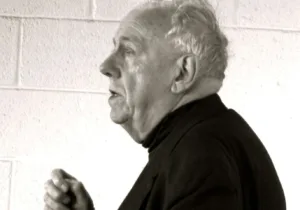While the COVID pandemic appears to be subsiding, the scars in the loss of life and confidence in our institutions continue to linger. In my edited collection, Making Sense of Diseases and Disasters, several authors examine how societies make sense of these types of events where political priorities realign, government legitimacy is questioned, and protests and violence break out. In the United States, our reliance upon scientific expertise to address the pandemic resulted in public distrust and political polarization. The question we need to ask ourselves is how we can avoid a future catastrophic response when another pandemic or other type of disaster befalls us.
In their chapter, Michael E. Promisel and Jeremiah H. Russell look to the teaching of Catholic Church as a possible guide for the United States. They note that the most fundamental questions in times of crisis are rarely scientific or managerial but rather moral. The questions society should ask are “Why should my freedom be restricted? Who determines what entities are ‘essential’?” and “What are our responsibilities to our fellow human beings?”
Promisel and Russell look to the teaching of Pope John Paul II’s on solidarity as the way the United States could have addressed COVID. For them, solidarity is “a virtue, occasioned by the inherent dignity and interdependence of human life that disposes us to act on behalf of the common good.” According to Pope Leo XIII’s Rerum Novarum (1891), people have a natural impulse to associate with one another in civil society. But this civil association is not one of mere transaction, but, according to John Paul II’s Sollicitudo Rei Socialis (1987), it is an appreciation of the inherent and eternal dignity of our fellow human beings. For Christians, it is the recognition of this eternal dimension of solidarity that is the bedrock for human dignity. As John Paul II puts it, we are “made a sharer, on a par with ourselves, in the banquet of life to which all are equally invited by God.”
The Christian recognition of the natural and valuable dignity of the human person makes solidarity possible. This does not translate into vague feelings of compassion as prompted by seeing scenes of disaster in a far-away country as shown on CNN, but instead cultivates a firm and preserving commitment to the common good of society. It is a “moral and social attitude,” as John Paul II states, that prompts concrete and specific action on behalf of everyone in society. Because of mutual responsibilities and shared humanity to one another, it is our duty to seek opportunities to act in the service of others. In other words, it is to practice the Christian virtue of charity.
Promisel and Russell describes this commitment of charity to the common good as follows:
In the light of faith, solidarity seeks to go beyond itself, to take on the specifically Christian dimension of total gratuity, forgiveness, and reconciliation. One’s neighbor is then not only a human being with his or her own rights and a fundamental equality with everyone else, but becomes the living image of God . . . One’s neighbor must therefore be loved, even if an enemy, with the same love with which the Lord loves him or her; and for that person’s sake one must be ready to sacrifice, even the ultimate one: to lay down one’s life for the brethren.
Charity is the practice of virtue that binds every member of society together in perfect harmony. According to the Catechism of the Catholic Church, it is “the form of virtues”—it articulates and orders the other virtues among themselves and is “the source and goal of their Christian practice.”
It is important to keep in mind that solidarity is not an abstraction empty of individual meaning or falls under the exclusive preview of the state. To contribute to the common good is to readily assist various individuals and particular communities in their contexts. According to the Catechism, the common good requires individuals to respect human persons, cultivate social well-being, and strive for peace achieved through a just order. For Promisel and Russell, to act in solidarity on behalf of the common good requires “the promotion and balance of all three of these elements”—not one value should triumph over another. To promote human flourishing for the communities we inhabit, we need to recognize the inherent dignity of each person and protect the less fortunate and work towards unity through just policies and proper human relations.
With respect to COVID, Promisel and Russell highlight that the “unequal treatment of religious institutions amid COVID lockdowns as a grave transgression of solidarity.” When states elevated certain commercial interests as “essential” or more important than religious worship, this constitutes a distorted vision of dignity, interdependence, and the common good. As John Paul II puts it, “The State has the duty of watching over the common good and of ensuring that ever sector of social life . . . contributes to achieving that right, while respecting the rightful autonomy of each sector.” The policies that target religious institutions elevate some groups over others and the physical needs of people over their spiritual ones. They propose a conception of the common good that is incomplete in the understanding of human dignity.
Promisel and Russell contend that wealthier nations should embrace a readiness to accept the sacrifices necessary for the good of the world community. An example is when President Biden committed to sharing over 80 million doses of the U.S. vaccine to poorer countries. However, the implementation of this was difficult, given the corruption risks of some of these countries. And within the United States this also proved to be problematic. When both the Trump and Biden administrations published national guidelines for allocation of the vaccine, both of which included preferential options for the poor and vulnerable, the implementation of those priorities were uneven at best. Wealthier and less vulnerable populations were often vaccinated at a higher rate than their poorer counterparts. Some states adopted age-based rollouts rather than need-based, while others ignored the guidelines to favor their family and friends first.
As COVID hopefully begins to recede, the federal government needs to look past medicine and managerial expertise when we are confronted with our next pandemic. Civil society, especially churches, can provide the principles that balance human dignity, social well-being, and justice. As Promisel and Russell have argued, the Catholic Church’s teaching on solidarity should serve as a signpost for the United States to navigate the next disaster it will confront—to see its citizens more than just bodies to be fed or favored the most powerful and wealthy over the poor and vulnerable. If we are to push past the political polarization and public distrust of our government, we must not look to Washington but to our own churches in the communities in which we inhabit for guidance, solidarity, and hope.







 Live in the DC area? Sign-up for Providence's in-person events list!
Live in the DC area? Sign-up for Providence's in-person events list!